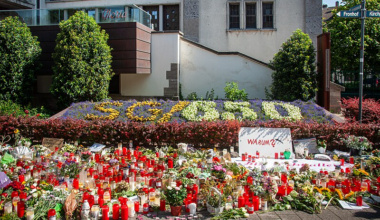
The UK that goes to the polls on 4 July will be the most religiously diverse in election history. Less than half the population of England and Wales describe themselves as ‘Christian’. Most people in Scotland are now non-religious. And there are now more Catholics than Protestants in Northern Ireland, but even here we are seeing more and more people turning away from religion.
This sustained shift in demographics demands a radical response from the state. Entrenched Christian privilege and a laissez-faire approach to social cohesion are ill-suited to a religiously diverse, pluralistic population. That’s why the National Secular Society is calling on the next Government to seriously rethink the role of religion in public and political life.
Here’s what we want to see from the incoming Government.
Secular, inclusive education
Schools play a key role in shaping future generations and fostering a culture of tolerance and understanding. But faith schools build division into the system.
A third of all schools are faith schools. This isn’t sustainable. Already, the prevalence of religious schools means many nonreligious families have no choice other than a faith-based education for their children. This needs to be addressed.
Dividing children by religion leads to ethnic segregation, too. The next Government should commit to phasing out faith-based education to better encourage integration and ensure that every child can receive a secular education.
The calling of the election means that the outgoing Government’s plans to abolish the 50% admissions cap in faith-based academies hit the buffers. The Conservative manifesto revives plans to lift the cap and allow faith schools to apply 100% religious selection, paving the way for yet more discriminatory faith schools.
Worryingly, Labour didn’t oppose plans to scrap the cap and will come under pressure from regressive religious groups to reinstate this policy. They should resist.
Religious selection means faith schools are not only less religiously and ethnically diverse; they admit fewer children from poorer backgrounds, children in care, and children with special educational needs and disabilities. Any government interested in tackling unfairness and discrimination in education can’t afford to ignore the pernicious effects of faith-based admissions. That’s why it is alarming that Keir Starmer has said a Labour Government would be ‘even more supportive of faith schools’ than the current Government.
In all state-funded schools, even the two-thirds without a religious character, daily acts of ‘broadly Christian’ collective worship are required by law. This law, dating back to 1944, has no moral or educational basis. Teachers don’t support it and many schools flout it. Imposing worship in schools undermines children’s freedom of religion or belief and opens the door to evangelism in schools. We will encourage the next Government to support its repeal as soon as possible.
England’s outdated model of religious education dates back to a similar era. Labour’s plans to modernise the school curriculum must not shy away from reforms to liberate this subject area from the inappropriate control of religious interest groups. All children and young people should have an equal entitlement to an objective and critical education about worldviews, citizenship, and ethics.
We will also push for new legislation to boost Ofsted’s powers to crack down on unregistered religious schools operating illegally. The creation of a register of children not in school is a key part of this. During their time in office, the Conservatives made plenty of encouraging noises but ultimately failed to tackle the problem. The required legislation for a register was in the Schools Bill which was ditched by the Sunak Government in 2022. The Tory manifesto promises to revive the register plans.
Labour’s manifesto makes no such commitment, but the Shadow Secretary of State for Education, Bridget Phillipson, has previously signalled her support for a home-school register to deliver better oversight of home education, which in too many cases leads to children being indoctrinated with fundamentalist dogma in unsafe and illegal schools. She also says she wants ‘every child to receive a world-class education’. To achieve this, the next Government will need to stand up to religious lobbyists who impede attempts to protect the educational rights of children in independent and unregistered religious schools by spuriously claiming that such attempts violate religious freedom.
Free speech
For all its faults, the Conservative Government has shown willingness to protect the right to free expression. It was slow to do so when Islamic fundamentalists descended on a school in Batley in 2021. But after a parent was left pleading for mercy after her son was involved in the scuffing of a Quran in Kettlethorpe last year, the Home Secretary robustly asserted: ‘We do not have blasphemy laws in Great Britain, and must not be complicit in the attempts to impose them on this country.’
A recent recommendation for the creation of guidance to better protect schools and teachers facing blasphemy accusations should be adopted and implemented—as should the recommendation from Sara Khan, the Government’s Independent Advisor on Social Cohesion and Resilience, to create a special unit tasked with responding to ‘flashpoint incidents’ such as blasphemy protests.
The next Government needs to find ways to address anti-Muslim prejudice in ways that don’t impede the freedom to scrutinise and criticise Islamic beliefs, ideas, and practices. It needs to be clear that there is no right not to be offended—and no legal obligation to be reverent towards any religion.
In opposition, Labour, the Liberal Democrats, the Scottish National Party, and the Greens have all shown a worrying disregard for free speech by uncritically adopting a definition of ‘Islamophobia’ proposed by the All-Party Parliamentary Group (APPG) for British Muslims. The concept of Islamophobia unhelpfully conflates hatred and discrimination against Muslims with criticism of Islam. This blurring is intentional. The silencing of scrutiny, criticism, mockery, and anything deemed ‘offensive’ has been a long-term aim of Islamist groups, some of which have been too close to Labour for comfort. Labour has promised to reverse the Conservatives’ decision to downgrade the monitoring of anti-Semitic and Islamophobic hate incidents that fall short of criminality. There are also fears that a Labour Government will seek to incorporate the APPG definition into law.
Hindu groups have jumped on the bandwagon, calling on the next Government to criminalise ‘Hinduphobia’. Any attempt to do so will be met with fierce opposition from secularists and free speech campaigners. Resisting the politics of competitive grievances and sectarianism is something the next Government needs to do if Britain is to avoid becoming increasingly fraught with ethnic and religious tensions.
Towards a secular democracy
It makes no sense for one of the most diverse and secularised nations in the world to retain an established religion.
One manifestation of the Church of England’s established status is the twenty-six unelected Anglican clerics sitting as of right as legislators in the House of Lords. In 2022, Keir Starmer called the Lords ‘undemocratic’ and ‘indefensible’. He launched plans drawn up by former Prime Minister Gordon Brown to replace the upper chamber with an elected Assembly of the Nations and Regions. The plans would bring a welcome end to reserved seats for bishops.
Despite originally suggesting the plans be implemented within the first five years of a Labour Government, the party is now promising a much more incremental approach. Replacing the House of Lords with an alternative second chamber remains the goal, but the manifesto commits only to ‘immediate modernisation’ of the Lords by introducing an upper age limit of 80 and scrapping hereditary peers. Secularists will be arguing that any immediate modernisation must also include the removal of the archaic, unfair, and undemocratic bishops’ bench.
But we need to go further. A state religion is incompatible with a democracy in which all citizens of every religion and belief are equal. The announcement of the election unfortunately spelt the end of a bill backed by the National Secular Society to disestablish the Church of England. But we’ll urge the next Government to engage with this long overdue democratic reform to transform the UK into a fully secular democracy, free from religious privilege.
A new administration will bring fresh hope for other necessary reforms, such as assisted dying, making wedding law fairer for all, outlawing caste discrimination, removing the advancement of religion as a charitable purpose, and effectively protecting children from abuse in religious settings.
Ultimately, Britain needs a new political framework to foster unity and keep religious fundamentalism in check by balancing religious freedom with other fundamental human rights. Secularism offers such a framework.
That’s why we’ll be urging the next Government to adopt secularist principles and policies which move us towards a freer and fairer society, where people can live by the creed they choose but where no particular religion or belief is privileged or imposed.
Related reading
Faith schools: where do the political parties stand? by Stephen Evans
Secularism and the struggle for free speech, by Stephen Evans
Religion and belief in schools: lessons to be learnt, by Russell Sandberg
The case for secularism (or, the church’s new clothes), by Neil Barber
Three years on, the lessons of Batley are yet to be learned, by Jack Rivington
Secularism is a feminist issue, by Megan Manson
Blasphemy and bishops: how secularists are navigating the culture wars, by Emma Park
Bad Religious Education, by Siniša Prijić
Silence of the teachers, by Nath Jnan
The perils of dropping a book, by Noel Yaxley
Britain’s blasphemy heritage, by David Nash
Cancel culture and religious intolerance: ‘Falsely Accused of Islamophobia’, by Steven Greer, by Daniel James Sharp
‘This is not rocket science’: the Disestablishment of the Church of England Bill 2023, interview with Paul Scriven by Emma Park








1 comment
Is there any NSS effort aimed at improving the secular nature of universities?
I was shocked to find that the first objective of my college seems to relate to the promotion of religion. Although this is a continuation of the founding objectives, there’s been a bit of science done since then. To quote the web site:
“Its primary charitable purpose is the pursuit of education, religion, learning and research,”
Although religion and religious rituals get a higher ranking in the supporting statutes establishing the college.
Your email address will not be published. Comments are subject to our Community Guidelines. Required fields are marked *
Donate